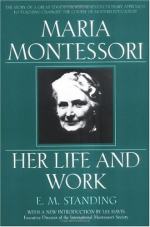
|
| Name: _________________________ | Period: ___________________ |
This test consists of 5 multiple choice questions, 5 short answer questions, and 10 short essay questions.
Multiple Choice Questions
1. In "Exploration, Development," what does Standing suggest is the reasoning some put behind the children's ability to work on their own in a Montessori classroom?
(a) They are simply playing and not learning.
(b) They are given directions before visitors come in.
(c) Strong discipline.
(d) Hypnotic influnce.
2. What was one limitation Montessori had for continuing her schools?
(a) Students.
(b) Funding.
(c) Staff.
(d) Community support.
3. When did Montessori write her first book on her work?
(a) 1929.
(b) 1919.
(c) 1909.
(d) 1899.
4. What is the first stage of development, ranging from age 0-6 years, considered?
(a) A stagnant period.
(b) A period of uniform growth.
(c) A period of transformation.
(d) A period of transformation.
5. According to Montessori, which of the following is not a cause for a deviation?
(a) Invasion.
(b) Failure to create.
(c) Freedom.
(d) Inhibition.
Short Answer Questions
1. What type of principles does the Montessori method focus?
2. Who, according to Montessori, offers profound insight into the truths of human nature?
3. In "Exploration, Development," what does Standing suggest is absent in a Montessori school?
4. According to Montessori, why it is important to have different educational principles for different stages of development?
5. According to Montessori, what effects does the herd instinct have in boys?
Short Essay Questions
1. What does Standing make clear about the content of this book?
2. Why did Montessori suggest the the first nine volumes of Child Psychology have not been written?
3. What type of challenges did Montessori face during her education and early career?
4. What connection was drawn between the Montessori method and different types of students?
5. According to Montessori, why is human development compared to a succession of new births?
6. In "Development," Standing notes a crossroads in Montessori's life. What was this crossroad and the result?
7. Why is the first stage of development called the Absorbent Mind?
8. According to Montessori, what is the difference between an external and internal aim to work?
9. What does Standing state goes along with exploration?
10. According to Montessori, why are the different types of metamorphosis important in education?
|
This section contains 862 words (approx. 3 pages at 300 words per page) |

|




